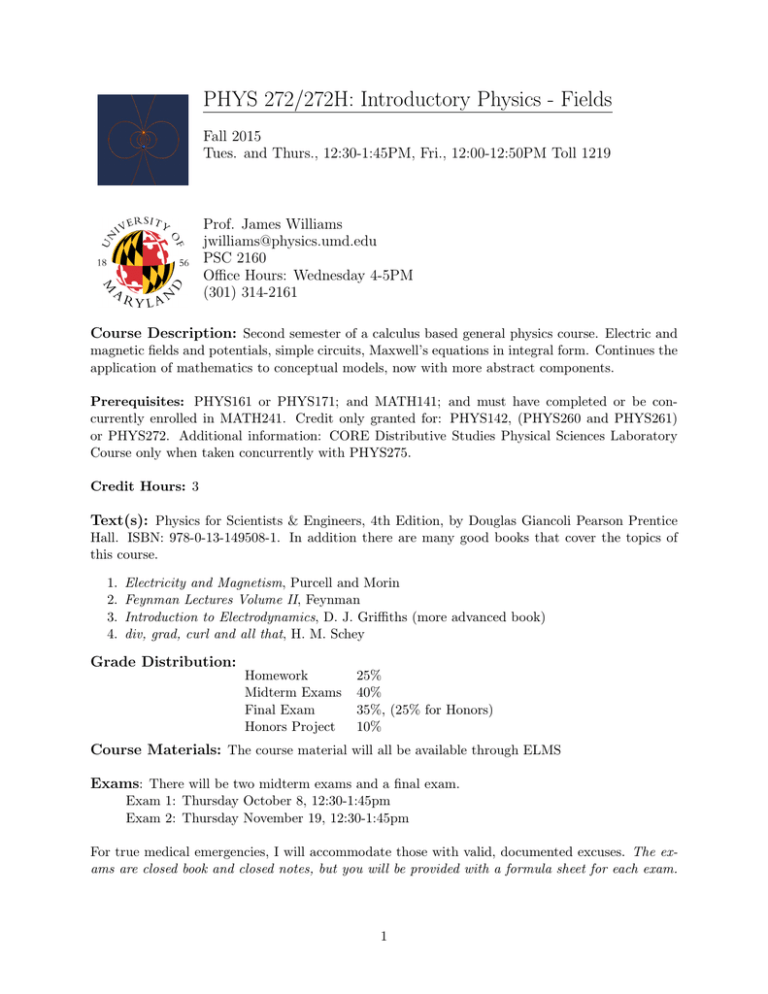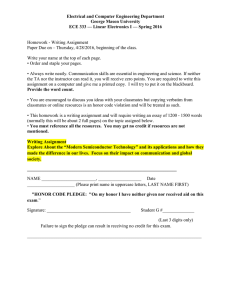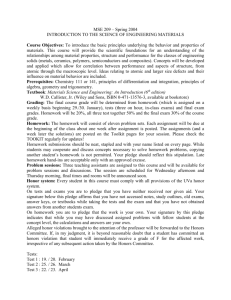
PHYS 272/272H: Introductory Physics - Fields
Fall 2015
Tues. and Thurs., 12:30-1:45PM, Fri., 12:00-12:50PM Toll 1219
Prof. James Williams
jwilliams@physics.umd.edu
PSC 2160
Office Hours: Wednesday 4-5PM
(301) 314-2161
Course Description: Second semester of a calculus based general physics course. Electric and
magnetic fields and potentials, simple circuits, Maxwell’s equations in integral form. Continues the
application of mathematics to conceptual models, now with more abstract components.
Prerequisites: PHYS161 or PHYS171; and MATH141; and must have completed or be concurrently enrolled in MATH241. Credit only granted for: PHYS142, (PHYS260 and PHYS261)
or PHYS272. Additional information: CORE Distributive Studies Physical Sciences Laboratory
Course only when taken concurrently with PHYS275.
Credit Hours: 3
Text(s): Physics for Scientists & Engineers, 4th Edition, by Douglas Giancoli Pearson Prentice
Hall. ISBN: 978-0-13-149508-1. In addition there are many good books that cover the topics of
this course.
1.
2.
3.
4.
Electricity and Magnetism, Purcell and Morin
Feynman Lectures Volume II, Feynman
Introduction to Electrodynamics, D. J. Griffiths (more advanced book)
div, grad, curl and all that, H. M. Schey
Grade Distribution:
Homework
Midterm Exams
Final Exam
Honors Project
25%
40%
35%, (25% for Honors)
10%
Course Materials: The course material will all be available through ELMS
Exams: There will be two midterm exams and a final exam.
Exam 1: Thursday October 8, 12:30-1:45pm
Exam 2: Thursday November 19, 12:30-1:45pm
For true medical emergencies, I will accommodate those with valid, documented excuses. The exams are closed book and closed notes, but you will be provided with a formula sheet for each exam.
1
ELMS/E-mail: I will use ELMS to communicate with the class. However, I can often be reached
at night or on weekends by email.
Lectures: Tuesday/Thursday 12:30-1:45pm, Friday 12:00-12:50 Room 1219, John Toll Physics
Building. Class time will be spent on a mixture of lecture material, lecture demonstrations, and
class discussion. You are responsible for all the assigned material, which for most chapters will
be all the material in Giancoli, even if it is not discussed in class. You should do the reading
assignments in the textbook before each class. Assignments will be listed in the Semester Schedule
on the course web site. NOTE: I will be away the week of Oct. 26th. Arrangements will be made
so that class will still be held.
Homework: The purpose of the homework is for you to engage with the material. This is how
you will master it, and it will help you discover what you don’t yet fully understand. Discussing
physics helps understanding. You are encouraged to discuss the homework with fellow students,
with our grader, or with Prof. Williams. However, what you turn in should be your own answers.
1. Usually assigned once every week.
2. Must be turned in at the beginning of class on the due date (not to the grader).
3. Please make sure you include your name and the homework and course numbers,
and staple the pages together.
4. Late homework accepted only under dire circumstances: if you know it will be
impossible to turn in an assignment on time you must discuss this with me in advance of the
due date.
Religious Observances: Students are responsible for notifying the instructor of any intended
absences for religious observances within the first two weeks of the semester.
Tips for doing well:
1.
2.
3.
4.
Attend class.
Freely ask questions both in and out of class.
Read the textbook before and after class.
Do all of the homework problems. This is mostly where you learn, and there is a strong
correlation between homework and exam grades.
5. Seek help immediately if you don’t understand the material.
Academic honesty: The University of Maryland, College Park has a nationally recognized Code
of Academic Integrity, administered by the Student Honor Council. This Code sets standards for
academic integrity at Maryland for all undergraduate and graduate students. As a student you are
responsible for upholding these standards for this course. It is very important for you to be award of
the consequences of cheating, fabrication, facilitation, and plagiarism. For more information on the
Code of Academic Integrity or the Student Honor Council, please visit http://www.shc.umd.edu.
The University has adopted an Honor Pledge, which is a statement undergraduate and graduate
students are asked to write by hand and sign on examinations, papers, or other academic assignments not specifically exempted by the instructor. The Pledge reads: ”I pledge on my honor that
I have not given or received any unauthorized assistance on this assignment/examination.” In this
course it is assumed that all students have entered the University agreeing to the honor principle
which would apply in general to all campus activities, so usually no specific statement is required.
2



